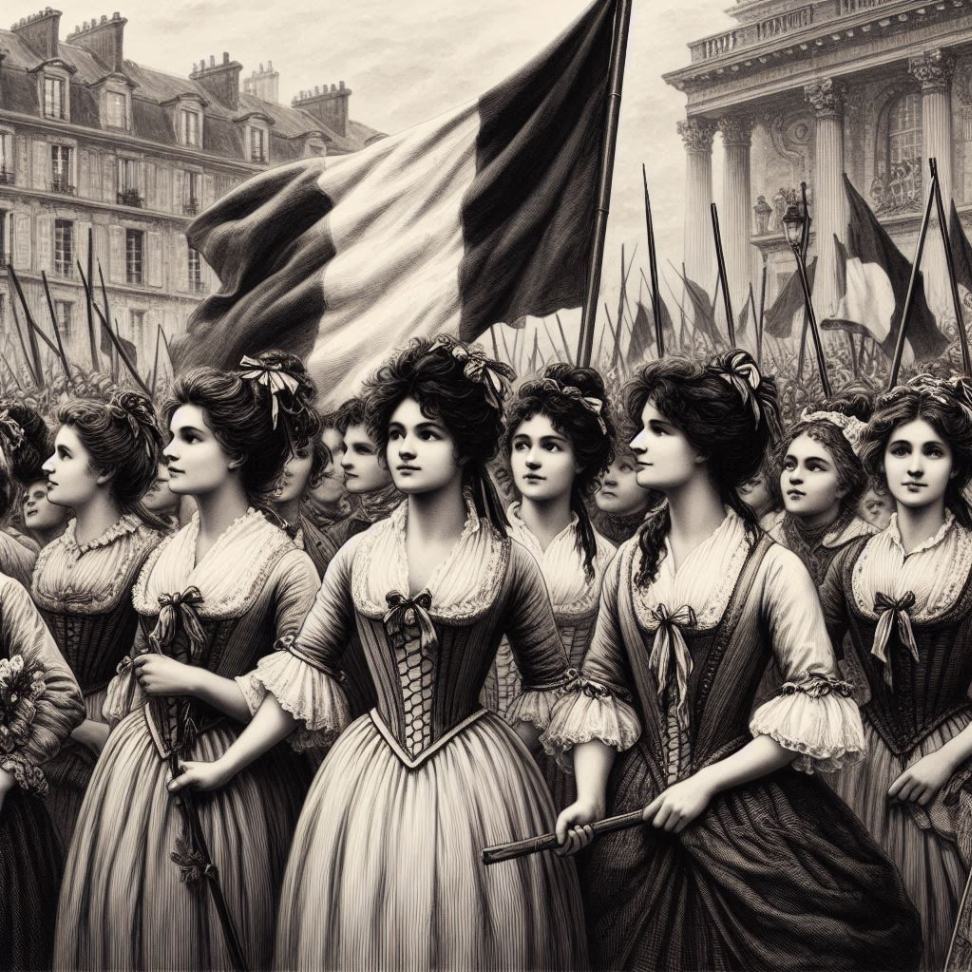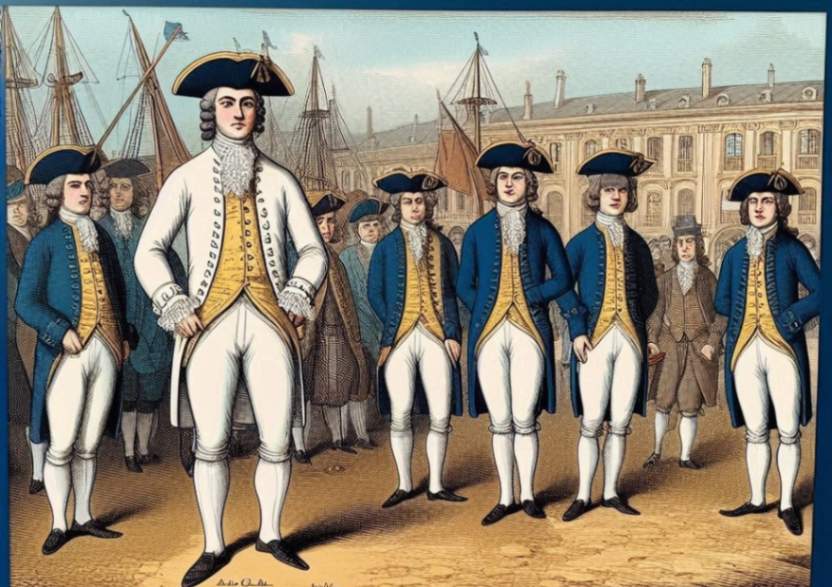Introduction
- In Part 10 of this chapter, we learnt about the emergence of a new government called “The Themidorian” and the new constitution introduced by them. In Part 11 we will discuss about what was the Role of women in the French Revolution, Women’s Club and the challenges faced by them.
Women’s participation in the French Revolution
- Women participated in the French Revolution from the beginning.
- They taught that by participating in the revolution, the new government “Revolutionary government” would establish equality and listen to the people’s needs.

Jobs of Third estate women
- Women from the third estate did different kinds of jobs to make money such as
- sewing clothes
- washing clothes
- Selling things in the market like flowers, fruits and vegetables.
- Domestic servant.
Education and Skills
- Most women in France could not read or right.
- Only boys went to school
- The cost of education was expensive.
- Women did not get special training for the job to learn new skills.
- French society expected women to stay home and care for their families.
- They earned lower wages compared to men. because
- French society valued men more than women.
- Women worked in less difficult jobs and so earned less wages than men.
- As French society was a male-dominated society, rules and decisions made were always in favour of men.
- Even when both genders did the same job, women still earned less. French society expected women to stay at home and care for their families, While it expected men to work and spend money on their families. But this rule is unfair. It shows French society did not have equality during the French Revolution.
Education for wealthy families
- Women from wealthy families or nobles went to convents to study.
- The Latin word “Convent” comes from the Latin word “Conventus” which means Gathering. So convent means a group of nuns who live together in a place and dedicate their lives to spiritual activities and service. Monks reside in Monasteries while nuns live in convents.
- Many well-educated nuns started teaching girls of wealthy families. They taught them moral and religious education. Girls from distant places lived and studied in convents. The church provided support to convents as it helped to spread religious values. Spreading religious values in society was the primary aim of the convent but later during the Renaissance period, its aim expanded to teaching general education, reading, writing, arts and music, arithmetic etc.
- After finishing education at the convent, families focussed on marriage for these girls to rich men to Maintain prestige in the society. By marrying a rich man, poor families of girls received money or property as a part of the marriage arrangement which helped the girl’s parent’s financial situation.
Women created clubs and Newspaper to share opinions
- Women in the French Revolution wanted to share their opinions therefore they created around 60 new groups called Clubs in different cities and established newspapers.
The main goal of women using clubs and Newspaper
- They want to share their opinions about the following:
- They wanted to establish equality for both genders in society.
- Women wanted the right to vote and work in government offices like men
- To improve their lives, women wanted the Revolutionary government to listen to their needs and decisions.
- To discuss jobs and wages, education for women etc.
Famous club out of 60 clubs
- Out of 60 clubs, a Club called “The Society of Revolutionary and Republican Women” became famous.
1791 constitution failed to provide political rights to women
- The new constitution created by the revolutionary government, also called the “1791 Constitution” did not provide women the right to vote, elect, or become members of the legislative assembly.
- Due to this, french women become sad because, despite political changes in France, there are no political rights for women.
Reforms brought by the Revolutionary government during its initial period
- During the initial period, The Revolutionary government made some rules to improve the lives of Women in the French Revolution:
- The government established government schools for girls. This government made it compulsory for girls to attend school and receive education.
- A father could no longer force his daughter to marry a man who she does not like. Women can now make their own choices about who to marry.
- The new reform allowed all genders to request a divorce. Before this reform, french society did not allow divorce.
- women can learn new job skills, become artists and start their own businesses.
- However, this government did not provide the right to vote, to elect, or to become members of the legislative assembly to women
Restrictions made by Reign of Terror on women
- During the reign of terror, a committee of public safety dominated by Jacobin club leader “Maximilien Robespierre” ordered to shut down the women’s club and did not allow women to enter politics.
- During the Reign of Terror, a committee of public safety dominated by Jacobin club leader “Maximilien Robespierre” sent women activists to jail and killed some of these women.
Long Struggle for Women’s Rights
- Fighting for women’s voting rights lasted for 153 years from 1791.
- In 1944 french women won the right to vote and work in government office.
- In 1946 french women got the right to elect and become members of the legislative assembly.
Activist Olympe de Gouges(1748-1793) discontent with the Revolutionary government
- She did not like the Revolutionary government as it did not give equal rights to women.
- In 1791, she wrote a letter called The Declaration of Rights of Woman and Citizen. She sent this letter to the queen of France “Marie Antoinette” and the National Assembly to make changes in women’s rights. They received the letter but did not make any changes to women’s rights.
- In 1793, she told Jacobin leader “Maximilien Robespierre” that it was unfair to shut down women’s clubs.
- National Convention put her on trial. They said she betrayed her country and was executed by the Guillotine.
Some of the rights mentioned in the Declaration of the Rights of Women and Citizen
- Like men, women are also born free and so they should have rights equal to men.
- All departments of government must protect people’s rights. People’s rights include:
- The freedom and rights of citizens
- Right to own property
- Right to be safe
- Right to protect from harm
- Right to stand up against unfair or bad treatment.
- Both women and men can decide how to run the country and what laws to make.
- Rules and Laws made by the government should match what people in the society want.
- Women and men both must have the right to vote, and elect a representative.
- The chosen representative must speak and decide on important matters on behalf of the people who selected them.
- Laws should treat everyone equally.
- Employers should give Jobs to both genders based on skills, capacity and talents not by their gender.
- The law should treat women and men equally. If a woman breaks the law, she will get the same punishment men as per law. There should be special privileges for women.
Jacobin politician Chaumette argued that they should close women’s clubs
- Cooking, cleaning and taking care of the home is not natural for men.
- Nature gave breasts to women to feed babies. While men do not have it. This difference shows that both genders have different jobs in life.
- Nature gave the jobs to men which included: hunting, farming, working under government making laws etc.
- French society thinks it’s wrong for women to try and do jobs that men traditionally do. Instead, Women should strictly follow their traditional roles: Cooking, cleaning and taking care of the home.
In Summary
The job of Women in the Third Estate
- Women from the third estate did different kinds of jobs to make money such as
- sewing clothes
- washing clothes
- Selling things in the market like flowers, fruits and vegetables.
- Domestic servant.
Education and Skills for Women
- Women from wealthy families received education in convents which was different from the experience of many other Women in the French Revolution.
- Most women in France could not read or right.
- Only boys went to school
- The cost of education was expensive.
- Women did not get special training for the job to learn new skills.
Gender Inequality in French Society
- French society expected women to stay home and care for their families.
- They earned lower wages compared to men. because
- French society valued men more than women.
- Women worked in less difficult jobs and so earned less wages than men.
- As French society was a male-dominated society, rules and decisions made were always in favour of men.
- Even when all genders did the same job, women still earned less. French society expected women to stay at home and care for their families, While it expected men to work and spend money on their families. But this rule is unfair. It shows French society did not have equality during the French Revolution.
How Women tried to change the rules in 1791
- They formed clubs and established newspapers to share their opinions and fight for equal rights, although the 1791 constitution did not grant them political rights.
Revolutionary Reforms for Women
- During the initial period, The Revolutionary government made some rules to improve the lives of women:
- The government established government schools for girls. This government made it compulsory for girls to attend school and receive education.
- A father could no longer force his daughter to marry a man who she does not like. Women can now make their own choices about who to marry.
- The new reform allowed all genders to request a divorce. Before this reform, french society did not allow divorce.
- women can learn new job skills, become artists and start their own businesses.
- However, this government did not provide the right to vote, to elect, or to become members of the legislative assembly to women.
Reign of Terror and Restrictions on Women
- During the reign of terror, a committee of public safety dominated by Jacobin club leader “Maximilien Robespierre” ordered to shut down the women’s club and did not allow women to enter politics.
- During the Reign of Terror, a committee of public safety dominated by Jacobin club leader “Maximilien Robespierre” sent women activists to jail and killed some of these women.
Long Struggle for Women’s Rights
- Fighting for women’s voting rights lasted for 153 years from 1791.
- In 1944 french women won the right to vote and work in government office.
- In 1946 french women got the right to elect and become members of the legislative assembly.
Olympe de Gouges: A Prominent Activist
- A Famous Activist and well-known figure among the Women in the French Revolution, Olympe de Gouges, opposed the revolutionary government as it did not grant equal rights to women.
- She wrote a letter called The Declaration of Rights of Woman and Citizen. She sent this letter to the queen of France “Marie Antoinette” and the National Assembly to make changes in women’s rights.
- They received the letter but did not make any changes to women’s rights.
- She fought for women’s rights and criticized the government, so the government put her to death.
Jacobin politician Chaumette’s view
- Jacobin politician Chaumette argued that they should close women’s clubs:
- He believed Women should stick to traditional duties such as Cooking, cleaning and taking care of the home.
- Women should not take on jobs or roles that men did which include: hunting, farming, working under government making laws etc.
- He thought it was inappropriate for women to step outside these traditional roles.



